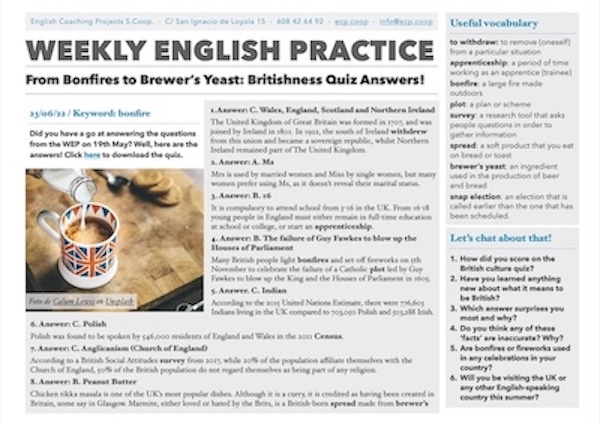Useful vocabulary
Listen to the audio and read the text.
Did you have a go at answering the questions from the WEP on 19th May? Well, here are the answers! Click here to download the quiz.
7. Answer: C. Anglicanism (Church of England)
According to a British Social Attitudes survey from 2017, while 20% of the population affiliate themselves with the Church of England, 50% of the British population do not regard themselves as being part of any religion.
8. Answer: B. Peanut Butter
Chicken tikka masala is one of the UK’s most popular dishes. Although it is a curry, it is credited as having been created in Britain, some say in Glasgow. Marmite, either loved or hated by the Brits, is a British-born spread made from brewer’s yeast.
9. Answer: B. Every five years, on the first Thursday in May
General elections take place every five years. Since the Fixed-term Parliaments Act 2011, the Prime Minister cannot call a ‘snap’ election without a two-thirds majority in a parliamentary vote.
10. Answer: C. Showing up at someone’s house to say ‘hello’ uninvited
The British tend to value their privacy, so appearing on someone’s doorstep unexpectedly can be taken as an invasion of this privacy. It is always better to let somebody know you’re visiting them before knocking on their door!
11. Answer: B. (See this week’s video for an explanation!)
Bonus question: The dish on page 1 of the quiz in May was of course fish ’n’ chips.
Adapted from this quiz by ECP coach Alison Keable
Let’s chat about that!
1. How did you score on the British culture quiz?
2. Have you learned anything new about what it means to be British?
3. Which answer surprises you most and why?
4. Do you think any of these ‘facts’ are inaccurate? Why?
5. Are bonfires or fireworks used in any celebrations in your country?
6. Will you be visiting the UK or any other English-speaking country this summer?

